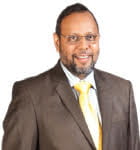Friday, February 26, 2021
9:00 a.m. – 10:30 a.m.
via WebEx
This was the seventh webinar in the “Envisioning India” series, co-sponsored by the Sigur Center for Asian Studies and the Institute for International Economic Policy. It is a platform for dialogue and debate. We invited you to engage with us in this series of important discussions.
The “Envisioning India” series is organized under the stewardship of IIEP Co-Director James Foster, Oliver T. Carr, Jr. Professor of International Affairs and Professor of Economics, and IIEP Distinguished Visiting Scholar Ajay Chhibber. The seventh event on “India’s Farm Laws” featured Kaushik Basu, Mahendra Dev, and Sudha Narayanan. The discussion was moderated by IIEP Co-Director Jay Shambaugh.
In September 2020, the Indian Parliament passed 3 farm acts: The Farmers’ Produce Trade and Commerce (Promotion and Facilitation) Act, 2020; Farmers (Empowerment and Protection) Agreement on Price Assurance and Farm Services Act, 2020; Essential Commodities (Amendment) Act, 2020. The laws allow farmers to sell outside regulated government markets, allow contractual farming and remove cereals, onion, potato and oil seed from the essential commodities list. The laws ostensibly designed to modernize the farm sector have generated huge protests in India, led to violence on India’s Republic Day, January 26, and continue unabated. Farm Associations and many experts consider them anti-farmer, whereas others think these reforms are necessary to move Indian agriculture forward. India’s farm sector provides only 15% of India’s GDP but provides livelihood for almost 50% of the population. The stakes are indeed high.
Our distinguished panel of experts debate the laws, place them in a broader context of India’s agricultural sector problems and suggest possible solutions.
About the speakers:
 Kaushik Basu is Professor of Economics and Carl Marks Professor of International Studies at Cornell University. He is currently the President of the International Economic Association and a nonresident senior fellow in the Global Economy and Development program at the Brookings Institution. He recently served as Chief Economist at the World Bank and before that was Chief Economic Adviser to the Government of India. During his four years at the Bank he co-taught a popular course in the Elliott School with James Foster, entitled Introduction to Game Theory and Strategic Thinking, which every week brought 150 GW students and many visitors from the Bank and other neighboring institutions to the Harry Harding Auditorium of the Elliott School. One class per term was held in Preston Auditorium of the World Bank. As one student commented “Being taught by Prof. Basu was definitely an only at GW moment!” He has now returned to Cornell but fondly remembers his time in DC – especially his weekly chats with GW students and his daily strolls across the GW campus from home to work in the Bank, and back again.
Kaushik Basu is Professor of Economics and Carl Marks Professor of International Studies at Cornell University. He is currently the President of the International Economic Association and a nonresident senior fellow in the Global Economy and Development program at the Brookings Institution. He recently served as Chief Economist at the World Bank and before that was Chief Economic Adviser to the Government of India. During his four years at the Bank he co-taught a popular course in the Elliott School with James Foster, entitled Introduction to Game Theory and Strategic Thinking, which every week brought 150 GW students and many visitors from the Bank and other neighboring institutions to the Harry Harding Auditorium of the Elliott School. One class per term was held in Preston Auditorium of the World Bank. As one student commented “Being taught by Prof. Basu was definitely an only at GW moment!” He has now returned to Cornell but fondly remembers his time in DC – especially his weekly chats with GW students and his daily strolls across the GW campus from home to work in the Bank, and back again.
Professor Basu has research interests that span across development economics, welfare economics, game theory, industrial organization, and law. As a professor at the Delhi School of Economics, he founded the Centre for Development Economics in 1992 and served as its first Executive Director. Kaushik Basu holds a B.A. in Economics from St. Stephen’s College, Delhi University, and M.Sc. and PhD in Economics from the London School of Economics, and several honorary degrees, including doctorates from IIT Bombay, Fordham University New York, Bath University, England, and the University of Florence. His recent books are “An Economist in the Real World” and “The Republic of Beliefs.”
 S. Mahendra Dev has been the Director and Vice Chancellor of the Indira Gandhi Institute of Development Research (IGIDR) in Mumbai, India, since 2010. Prior to this, he was Chairman of the Commission for Agricultural Costs and Prices for the Ministry of Agriculture of the Government of India, Director of the Centre for Economic and Social Studies in Hyderabad, and Acting Chairman of the National Statistical Commission of the Government of India. He is a recipient of the Malcolm Adiseshiah Award for outstanding work on development studies and has approximately 120 research publications in international and national journals in the areas of agricultural development, poverty, public policy, inequality, food security, nutrition, employment guarantee schemes, social security and farm and nonfarm employment. He has written or edited 20 books, including Inclusive Growth in India. He is a member of the Board of Trustees of the International Food Policy Research Institute and was nominated to serve as Vice Chair of the Board beginning in 2018. He has been a consultant and adviser to many international organizations, including the United Nations Development Programme, the World Bank, the International Labour Organization, the Food and Agriculture Organization of the United Nations, United Nations Economic and Social Commission for Asia and the Pacific, UNICEF, UNESCO, the UK Department for International Development, and the Organization for Economic Cooperation and Development. He received his PhD from the Delhi School of Economics and completed his postdoctoral research at Yale University.
S. Mahendra Dev has been the Director and Vice Chancellor of the Indira Gandhi Institute of Development Research (IGIDR) in Mumbai, India, since 2010. Prior to this, he was Chairman of the Commission for Agricultural Costs and Prices for the Ministry of Agriculture of the Government of India, Director of the Centre for Economic and Social Studies in Hyderabad, and Acting Chairman of the National Statistical Commission of the Government of India. He is a recipient of the Malcolm Adiseshiah Award for outstanding work on development studies and has approximately 120 research publications in international and national journals in the areas of agricultural development, poverty, public policy, inequality, food security, nutrition, employment guarantee schemes, social security and farm and nonfarm employment. He has written or edited 20 books, including Inclusive Growth in India. He is a member of the Board of Trustees of the International Food Policy Research Institute and was nominated to serve as Vice Chair of the Board beginning in 2018. He has been a consultant and adviser to many international organizations, including the United Nations Development Programme, the World Bank, the International Labour Organization, the Food and Agriculture Organization of the United Nations, United Nations Economic and Social Commission for Asia and the Pacific, UNICEF, UNESCO, the UK Department for International Development, and the Organization for Economic Cooperation and Development. He received his PhD from the Delhi School of Economics and completed his postdoctoral research at Yale University.
 Sudha Narayanan joined IFPRI’s South Asia Regional Office in December 2020 as a research fellow. Sudha’s research interests straddle agriculture, food and nutrition policy, and human development. She is particularly interested in survey-based research using micro econometric approaches to understand broader questions of agrarian change and state delivery systems for nutrition security. Her research focuses on contract farming, agrifood value chains, technology adoption in agriculture, public policies for food security and employment and agriculture-nutrition linkages.
Sudha Narayanan joined IFPRI’s South Asia Regional Office in December 2020 as a research fellow. Sudha’s research interests straddle agriculture, food and nutrition policy, and human development. She is particularly interested in survey-based research using micro econometric approaches to understand broader questions of agrarian change and state delivery systems for nutrition security. Her research focuses on contract farming, agrifood value chains, technology adoption in agriculture, public policies for food security and employment and agriculture-nutrition linkages.
She was previously an Associate Professor at the Indira Gandhi Institute of Development Research (IGIDR), Mumbai. She obtained a PhD from Cornell University in 2011, specialising in agricultural economics. She earlier obtained M.A. and M.Phil. degrees in Economics from the Delhi School of Economics, India. Prior to studying for a doctoral degree, Sudha worked with the Institute of Economic Growth, Delhi, the Right to Food Campaign in India and Cornell University, among others.
